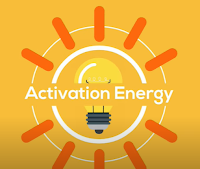In order for a chemical reaction to occur, there must be enough energy to break the bonds that hold the particles together in a molecule. The speed at which new particles form is called the rate of reaction.
Before a skateboard will move energy must be applied to cause the skateboard to move.
In a similar manner, a chemical reaction must also have a boost in energy in order to get the reaction to occur.
This boost of energy is called activation energy and is the least amount of energy needed in order to get molecules to react.
Think of a match. The match has all of the reactants it needs to burn but you must strike the match, which provides friction which creates heat, which provides the activation energy needed to start the reaction.
What are some factors that affect the rate of reactions?
There are four factors that impact the rate of reaction.
Temperature, Concentration, Surface area, and an Inhibitor or Catalyst.
Temperature The higher the temperature the faster the rate of reaction.As temperature rises the particles of the reactants move quickly which causes the particles to collide more often and with greater energy so many reactants can change into particles in a short time
Concentration In general a high concentration of reactants will cause a fast rate of reaction. Concentration is the measure of the amount of one substance dissolved into another. When concentration is high the particles are close to each other which increases how often the reactants collide and the reaction accelerates.
Surface area Increasing the surface area of solid reactants increases the rate of reaction.
A greater surface area exposes more of the reactants to other reactants thus increasing the rate of reaction. For example, grinding a solid into a powder increases the surface area and speeds up the rate of reaction.
Inhibitors an inhibitor is a substance that slows down the rate of a reaction There are three common types of inhibitors
Corrosion inhibitor: A corrosion inhibitor decreases the rate of oxidation of the metal.
Enzyme inhibitor: In chemistry and biology, an enzyme inhibitor binds to an enzyme, lessening its activity.
Reaction inhibitor: A reaction inhibitor is any substance that decreases the rate of a chemical reaction.
A catalyst is a substance that speeds up a reaction It does this by lowering the activation energy of a reaction. Some enzymes in your body are catalysts and speed up chemical reactions.




0 comments:
Post a Comment